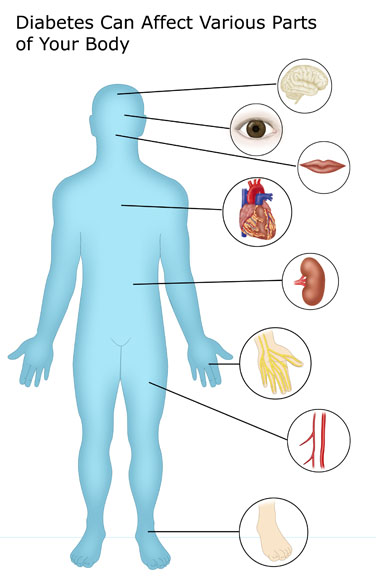Know the differences and you will be able to take effective precautions against both.
Acute Complications
Serious, life-threatening complications can arise quickly. Fortunately, such complications can go away just as quickly if you – and those closest to you — know what to do and how to do it.
Acute complications arise from uncontrolled high blood sugars (hyperglycemia) and low blood sugars (hypoglycemia) caused by a mismatching of available insulin and need. In short, you either have taken too much diabetes medication or too little.
Some acute complications require immediate medical attention.
These emergencies include:
Chronic Complications
Chronic complications tend to arise over years or decades. Often, there is damage before there are symptoms so routine screening is recommended to catch and treat problems before they occur or get worse.
Learn more about chronic complications.
Problems include:
- Vision loss or blindness
- Kidney damage or failure
- Nerve pain and damage
- Heart and blood vessel disease
- High blood pressure
- Dental problems
- Hand problems
- Foot problems

For both acute and chronic complications, tight control of blood sugar is the best treatment. Other interventions that help keep complications to a minimum include:
- Controlling blood pressure
- Controlling blood cholesterol and triglyceride levels
- Controlling your weight
- Exercising
- Not smoking
- Regular screening
VIGILANCE AND A HEALTHY LIFESTYLE PUT YOU IN CONTROL
Self-assessment Quiz
Self assessment quizzes are available for topics covered in this website. To find out how much you have learned about Diabetes Complications, take our self assessment quiz when you have completed this section. The quiz is multiple choice. Please choose the single best answer to each question. At the end of the quiz, your score will display. If your score is over 70% correct, you are doing very well. If your score is less than 70%, you can return to this section and review the information.
